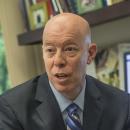Students Spearhead Win for Police Accountability Project
While working for the Police Accountability Project at the Mandel Legal Aid Clinic, I had the incredible experience of representing a client at trial in Cook County Circuit Court. Our client, Mr. Solomon Bey, was almost sixty years old when he was beaten by two City of Chicago police officers in an abandoned yard on the South Side. The officers took Mr. Bey by surprise as he was trying to relieve himself. They pulled a gun on him, punched him, and kicked him to the ground, causing him to lose control of his bowels. Mr. Bey sued the two officers and the City in Small Claims Court for battery, assault, and intentional infliction of emotional distress.
Mr. Bey's lawsuit had been pending for two years by the time my classmates, Kimberly Jeffers and Darren Perconte, and I began working on it. His case had amassed two filing drawers worth of research, pre-trial motions, and discovery. With the work of previous student teams behind us and under the supervision of Clinical Professor Craig Futterman, Kim, Darren, and I planned every stage of the trial - from brainstorming themes and trial strategy to the closing statement. None of us had previously been responsible for this kind of trial work. To prepare, we researched Illinois evidentiary rules, tracked down additional witnesses, and gamely learned the ins and outs of Small Claims Court. We wrote and argued motions in limine, conferred with opposing counsel, and prepared blow-up exhibits for trial. We repeatedly mooted opening and closing arguments, voir dire, direct exams, and cross examinations.
Over the months of work, the parts of the trial started to fit together. I began to see the trial process like a short story in progress: the events and decisions of the past influencing and leading to the events of the future. Our choice of theme and our conception of the case from the earliest meetings shaped our motions in limine. The judge's ruling on these motions shifted trial strategy: how we argued, what we asked the officers on cross-examination. The progress of the trial, the victories and setbacks of objections won and lost influenced the tone of closing. When the jury announced its verdict, it concluded the short story we had been writing, finding liability against both officers on every count.
Looking back on the experience, it is easy to read all of our decisions, revisions, and late-night battles as leading inevitably to the conclusion. What I learned from working with my classmates and from Professor Futterman, however, was the unpredictable, slippery nature of a case as it makes its way through pretrial, trial, and comes to rest with a jury. It was humbling to have exerted so much force- to have chosen diction, arguments, and demonstrations, to have practiced tone and body language, to have organized and structured the narrative-only to release the beast into the hands of the jury, finally wild. While we waited over four hours for the jury to deliberate, I felt this humility most keenly for our client. For us, it would have been a loss, but for him, it would have been a rejection, a revision of the story of his beating into something commonplace and false.
But we didn't lose; we won. Mr. Bey said afterwards that he felt vindicated. He shook his head in disbelief that "all those people" on the jury had taken his word over the staunch disavowals of the two officers. Despite telling his story truthfully and eloquently, Mr. Bey understood how difficult it would be for a jury to decide against two police officers. He said he was so elated after hearing the verdict that he told complete strangers about the case on the El ride home. Having the opportunity to serve Mr. Bey and to help him tell his story through trial was immeasurably rewarding. Mr. Bey expressed gratitude to all of the University of Chicago Law School students who had worked with him in the past. He remembered all of their names and by the last day of trial, he had added our names to the roster of what he called his "dream team" of lawyers.
